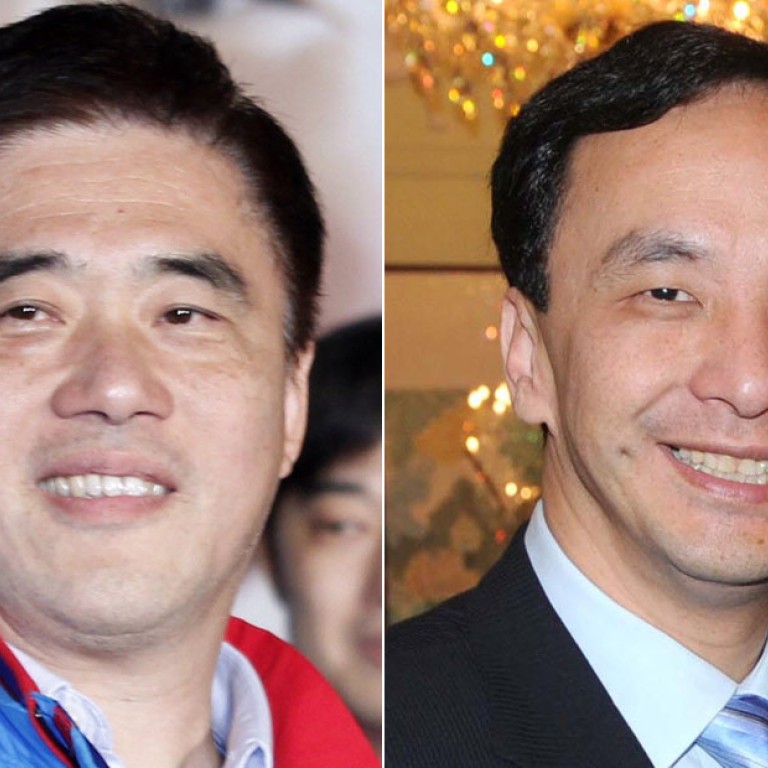
KMT promotions offer clues to Ma Ying-jeou's succession plans
Taiwanese leader's elevation of three mayors to party deputy chairs comes after calls to share power with younger, reform-minded members
Taiwanese President Ma Ying-jeou has succeeded in a motion to appoint three prominent mayors to serve as vice-chairmen of the ruling Kuomintang.
Political analysts suggest the mayors are being groomed to be the next generation of KMT leaders. Ma may have proposed the intra-party promotions with his succession in mind, they say.
The island's next presidential poll is in 2016, and while some observers believe it is too early for talk of succession, the season of political calculus and strategising has begun.
In a meeting on Wednesday, the KMT approved Ma's motion to appoint as party vice-chairmen New Taipei City Mayor Eric Chu Li-luan, 52; Taipei Mayor Hau Lung-bin, 61; and Taichung Mayor Jason Hu Chi-chiang, 65.
They replace Chan Chun-po, John Chiang Hsiao-yen and Lin Fong-cheng, effective immediately.
Chu, a former vice-premier and rising political star, has been tapped by local media as a potential successor to Ma.
All the appointees carry major constituencies in KMT strongholds
At the meeting, Ma denied the shuffle had anything to do with his succession, referring to the appointments as a "very important decision" for the party and consistent with his vow to reform it following the "sunflower" student movement.
Local pundits said mounting calls for change within the KMT following student-led protests forced Ma to consider sharing power with younger, more reform-minded members of the party.
About 200 students, backed by thousands of supporters, occupied the island's parliament building from March 18 to April 10 to oppose a trade services pact signed with the mainland in June.
Claiming the pact would threaten jobs and erode Taiwan's young democracy, the students criticised Ma's leadership and demanded the pact be nullified.
The three-week long protest, followed by an anti-nuclear rally in front of Ma's office that lasted nearly a week, have seen the leader's approval ratings tumble and a decline in support for the KMT. The government has agreed to hold off on commercial operations of the island's fourth nuclear energy plant once construction is complete and put the matter to a referendum.
Analysts said the appointments would take some heat off Ma and improve party efficiencies.
Including the new appointees in the party's decision-making body "can help minimise differences between" ranking members of the party and its constituents in policymaking, which would satisfy local demands, said Liao Da-chi, professor of political science at Sun Yat-sen University in Kaohsiung.
Thomas Peng, an associate professor of political science at National Taiwan University, said party procedures needed to be amended to ensure KMT members at the vice-chairmen level were able to participate in the party's decision and policy-making, and reform process.
Peng called for systemic changes to intra-party governance, covering attendance during certain caucuses, committees and votes, to the role and responsibilities members are obliged to shoulder, to ensure favourable election outcomes.
Several analysts doubted whether Ma was genuinely in favour of power-sharing within the party, suggesting that the appointments were a way for him to control intra-party rivals who may prove useful after the May 2016 poll.
"It could just be a gimmick for Ma to keep their mouths shut and shift political responsibility if the KMT is defeated in the year-end local elections," said Hsu Yung-ming, an associate professor of political science at Soochow University in Taipei.
The newly appointed vice-chairmen have openly criticised some of Ma's policies, including the nuclear power plant project that triggered the recent wave of protests.
George Tsai Wei, a professor of political science at Chinese Culture University in Taipei, said there was no indication that Ma's shortlist of successors included the three vice-chairmen.
"As long as Ma remains mum over the naming of his successor, he can continue to control the party [as chairman of the KMT] and avoid becoming a lame duck [president]," Tsai said.

